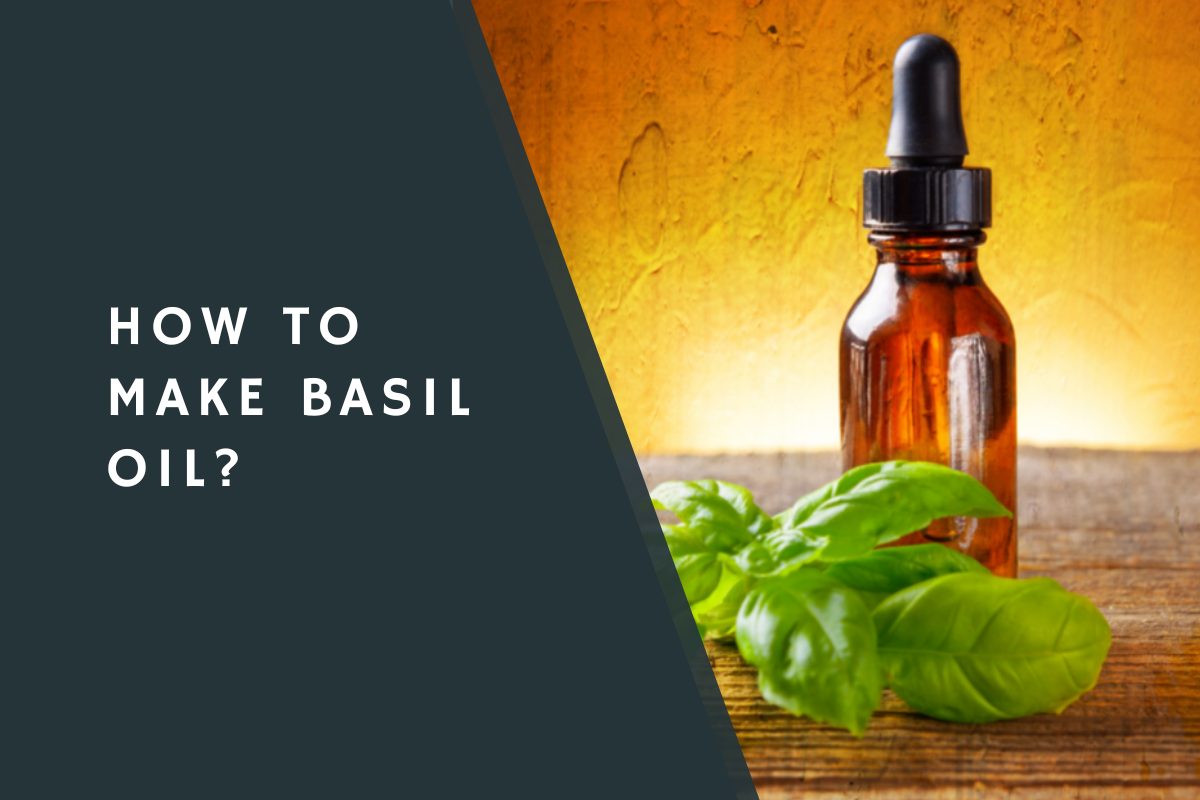Basil is a fragrant herb that has been used for centuries for cooking, medicinal purposes, and even as a fragrant oil. Basil oil is an essential oil derived from the leaves of the basil plant that has a sweet, herbaceous aroma.
How to Make Basil Oil?
To make basil oil, start by gathering some fresh basil leaves. Heat a small amount of oil in a pan over medium heat. Add the basil leaves and cook until they are wilted about 2 minutes. Remove from the heat and let cool.
The oil is widely used in perfumery, aromatherapy, and natural soaps, and cosmetics. In this article, we’ll discuss what basil oil is, its health benefits, and how to make it.

Read Also: How to Dry Basil Leaves?
What is Basil Oil?
Basil oil is an essential oil that is obtained from the leaves of the basil plant (Ocimum basilicum). The oil has a sweet, herbaceous, and slightly spicy aroma and has been used for centuries in cooking, perfumery, aromatherapy, and natural cosmetics. Basil oil is made by steam distillation of the leaves of the basil plant.
Benefits of Basil Oil
Basil oil has a myriad of health benefits. It is said to relieve stress and anxiety, improve focus, and promote mental clarity.
It also has anti-inflammatory properties which can help to reduce inflammation, headaches, and muscle pain. Basil oil can also help to boost the immune system and stimulate circulation.
Safety Precautions
Basil oil should always be diluted with a carrier oil, such as jojoba or almond oil before it is applied to the skin. It should also not be used by pregnant women, as it can cause uterine contractions. Additionally, basil oil should not be taken orally, as it can be toxic.
How to Make Basil Oil Method?
Making basil oil is a relatively simple process that requires a few basic supplies. You will need:
- Basil leaves
- Distilled water
- A pot
- Mason jar
- Cheesecloth
- A thermometer
- An airtight container
Step 1: Start by gathering your basil leaves. Make sure that they are clean and dry.
Step 2: Place the basil leaves in the mason jar and cover them with distilled water.
Step 3: Place the mason jar in the pot and fill the pot with water so that the mason jar is submerged.
Step 4: Place the thermometer in the pot and bring the water to a boil. Reduce the heat to low and simmer for 3-4 hours.
Step 5: After simmering, remove the mason jar from the pot and pour the liquid through the cheesecloth. This will strain out the basil leaves.
Step 6: Place the liquid back into the pot and bring it to a boil. Reduce the heat to low and simmer for 1-2 hours.
Step 7: Remove the pot from the heat and let it cool. Pour the liquid into the airtight container and store it in a cool, dark place.
Your basil oil is now ready to use!
How to Store Basil Oil?
Storing basil oil properly is important to ensure that its flavor and aroma is preserved. The best way to store it is to keep it in a cool, dark place such as a cupboard or kitchen pantry.
It should also be kept away from direct sunlight, as this can cause the oil to spoil faster. The oil should also be stored in a tightly sealed container to prevent any air from entering and spoiling the oil.
An example of a suitable container for storing basil oil is a glass jar with a lid that is tightly sealed, such as those used for canning.
The container should also be labeled with the date it was purchased, as well as a “use by” date so that you know when to discard the oil.
Additionally, it should be kept away from other strong-smelling items, such as garlic or onions, as this can affect the flavor of the oil.
Conclusion
Basil oil is a fragrant essential oil with many health benefits, including relieving stress and anxiety, improving focus, and stimulating circulation. It can be used in perfumes, aromatherapy, and natural cosmetics.
Making basil oil is a relatively simple process that requires a few basic supplies and takes several hours. After the oil is made, it should be stored in an airtight container in a cool, dark place.

